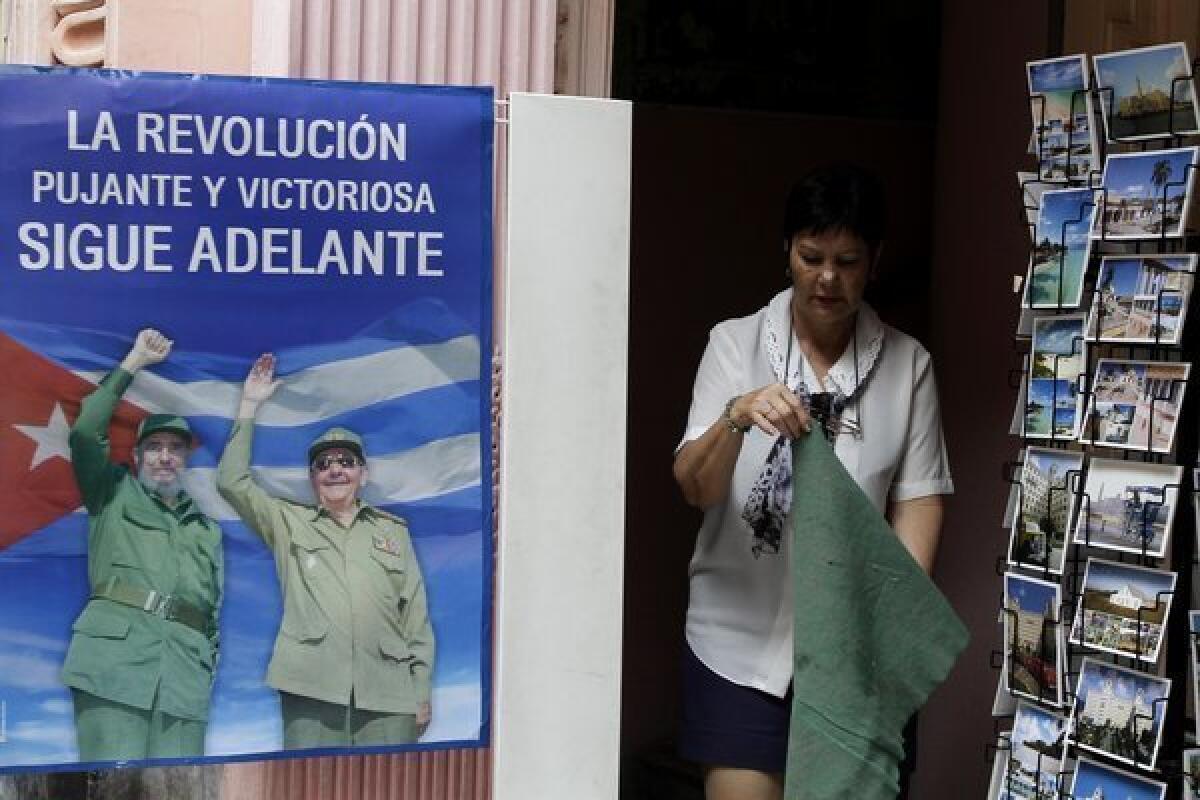Widely condemned U.S. policy on Cuba unlikely to change soon

- Share via
Washington and Havana have taken baby steps over the last four years to end some of the more destructive elements of their relationship, like a U.S. prohibition against Cuban Americans’ visiting their homeland more than once every three years and Cuba’s demand that citizens get exit visas to go abroad.
But this week’s overwhelming international censure of the U.S. embargo against Cuba -- a 188-3 vote of condemnation by the U.N. General Assembly -- was a sobering reminder of how little has changed between the Cold War adversaries despite President Obama’s 2008 campaign vow to end half a century of ideological standoff.
Foreign policy analysts see possibilities that Obama may have more room to maneuver in a second term. Younger Cuban Americans care more about staying in touch with family on the communist-ruled island than did their embittered elders, who fled after Fidel Castro’s 1959 revolution, vowing never to return until Cuba was free of the leftist firebrand.
Castro, now 86 and ailing, seems likely to be out of the picture within the next four years, say Cuba watchers who predict the commandante’s passing would ignite more profound rethinking of Cuban economic and foreign policy. Raul Castro, 81, has undertaken modest reforms, but he is seen as a placeholder who will be pushed aside once his brother dies.
Opportunities for improving U.S.-Cuba relations have been plentiful, and routinely squandered, since the Castros and their bearded guerrilla partisans drove out dictator Fulgencio Batista on New Year’s 1959. The revolution’s embrace of Stalinist ideology led to massive property confiscations, and the Eisenhower administration slapped on a first version of the enduring trade embargo in October 1960.
Under President Carter, envoys secretly sought to reconcile Cubans with their powerful northern neighbors, only to be rebuffed by the 1980 Mariel boatlift that carried 125,000 would-be emigres, prisoners and mental patients to U.S. shores. A political overture by President Clinton was snuffed out in 1996, when Cuban defense forces shot down two planes in international airspace that had been searching for Cuban rafters.
The latest provocation to derail reconciliation has been the detention of Alan Gross, a U.S. government emissary caught installing high-tech communications equipment on the island. U.S. officials cast Gross’ work as humanitarian relief; the Cuban government has accused him of violating its sovereignty.
“I think it is probably unlikely that any significant change can occur as long as the Cubans continue to have Alan Gross in jail, and the Cuban regime probably knows that,” said Ian Vasquez, Cuba policy expert at the Cato Institute in Washington. “The regime says it wants to end the blockade, but every time there has been a U.S. administration that would move toward normalizing relations, they do something that makes it politically difficult to move in that direction.”
Regardless of the Cuban leadership’s sordid record on human rights, Vasquez argued, the ban on trade, travel and diplomatic engagement with Cuba is “unenlightened.”
“It’s not the business of the U.S. government to fashion trade and investment and travel policy based on the misdeeds of other governments. If we did that, we would be cutting off a huge part of the world,” Vasquez said. “It’s counterproductive for ourselves and for world prosperity, even for the promotion of explicit U.S. goals to increase democracy and civil society.”
Andy Gomez, senior fellow at the Institute for Cuban and Cuban-American Studies at the University of Miami, said the community in South Florida has applauded Obama’s easing of family travel and academic exchanges with the island. He doesn’t see prospects for improvement much beyond that unless and until the Castros are gone.
Even then, Gomez said, it will take years for Cubans to break the state stranglehold on the economy and acquire respect for civil and human rights.
“We’ve learned that we can’t export American values and attitudes to countries that don’t have the institutions to support them, and Cuba doesn’t,” Gomez said.
Obama’s moves to lift limits on emigre visits and remittances to Cuban relatives have been widely applauded on both sides of the Florida Strait. Those changes have built a stronger sense of community between the two nations and helped Cubans open small private restaurants, shops and services, said Philip Peters, vice president of the Lexington Institute think tank and founder of the Cuban Triangle blog on relations among Havana, Miami and Washington.
“More could have been done, certainly, one example being that there long ago ceased to be any justification for having Cuba on the list of state sponsors of terror,” Peters said.
He calls the standoff over Gross, who has been detained in Cuba since 2009, a self-inflicted wound and missed opportunity to build on Obama’s early advances.
“Given the economic challenges that our country faces domestically and the foreign policy challenges around the world, some of which are very acute,” Peters said, “there is no way in the world that Cuba is going to be a front-burner issue for President Obama in his second term.”
ALSO:
Egypt calls on U.S. to help stop Gaza fighting
Tamils seek probe after U.N. faults itself in Sri Lanka war report
Myanmar president announces prisoner release before Obama visit
A foreign correspondent for 25 years, Carol J. Williams traveled to and reported from more than 80 countries in Europe, Asia, the Middle East and Latin America.
More to Read
Sign up for Essential California
The most important California stories and recommendations in your inbox every morning.
You may occasionally receive promotional content from the Los Angeles Times.














